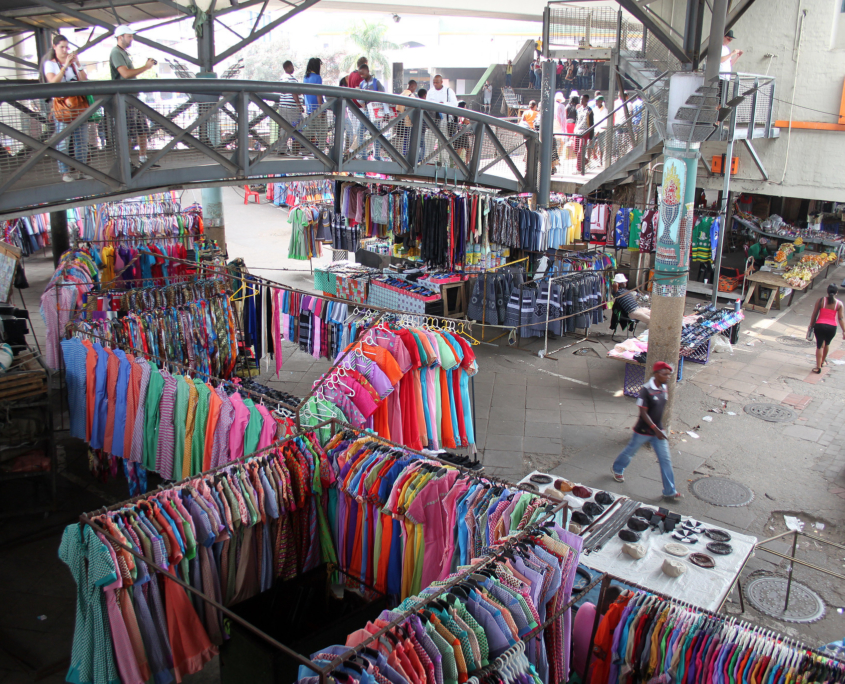The Informal Economy in South Africa
 If you walk down a busy street in any of South Africa’s major cities, you are bound to witness some type of informal economic activity. Whether it be a fruit stand, street-hawker selling earphones or an informal car wash business, the informal economy in South Africa is a crucial part of life for many of its residents.
If you walk down a busy street in any of South Africa’s major cities, you are bound to witness some type of informal economic activity. Whether it be a fruit stand, street-hawker selling earphones or an informal car wash business, the informal economy in South Africa is a crucial part of life for many of its residents.
The Importance of Informal Trade
Informal trade refers to any unregulated, unregistered, unprotected and untaxed activities, enterprises, or transactions. Informal jobs are an essential source of income for many poor South Africans—18 percent of working citizens work in the informal sector—a total of over three million workers. Additionally, the sector accounts for 18 percent of South Africa’s GDP. While these numbers are smaller than those of other developing countries, they emphasize the importance of informal trade in an economy with stark unemployment rates—26.6 percent as of 2016. Informal markets, like Durban’s Warwick Markets, provide jobs for those who are unable to find formal employment. Thousands depend on these markets for produce, cooked meals and clothing at affordable prices. Furthermore, the informal workforce in South Africa is overwhelmingly poor, young females. In fact, the poverty level in an area correlates positively with the proportion of people working in the informal economy.
The government recognizes the informal economy in South Africa as a viable and important form of employment and enabler of economic mobility for the country’s poor. Experience in the informal sector can help untrained people acquire skills, potentially aiding future integration into the formal sector. According to economist Loane Sharp, the informal economy in South Africa is growing faster than its formal counterpart. This prompts the government to pass policy encouraging and protecting the sector. The National Informal Business Upliftment Strategy of 2014 set up a framework of government assistance with skills development, marketing, technical support, infrastructure improvements and management training. This “inclusive growth” strategy focuses on enabling South Africa’s poor to participate in the economy rather than merely redistributing wealth through social welfare programs.
Non-governmental organizations are also working to improve conditions for informal traders. Asiye eTafuleni is an NGO in Durban that works with local government officials and vendors in the informal sector (particularly the Warwick Markets) to assist in developing infrastructure, consultations for urban planning and advocacy for informal workers. The organization also directs tourism to the Warwick Markets, educating foreigners and visitors on the functions and importance of the markets, and bringing the vendors eager customers. Asiya eTufuleni is a member of the Inclusive Cities mission, which focuses on uplifting and strengthening groups of working poor in the informal economy. The Inclusive Cities project aims to support the urban poor through lobbying, policy planning, and research. One of the ways the project does this is by advocating for “waste pickers’ rights,” the legal right of individuals to collect garbage to recycle into sellable goods. These rights are under threat by the privatization of solid waste management in many cities across Africa. Inclusive Cities also conducts research and analysis of the informal economy to support future endeavors and activism.
A Struggle for Informal Business Owners
There are many downsides to informal trade which make its participants particularly vulnerable. Informal business owners are often deterred from registering their enterprises by high taxes and strict regulations. Informal working conditions are unregulated by nature and therefore often poor. Dangerous locations, limited book-keeping skills and lack of insurance put informal traders at constant risk of losing their livelihoods. Average earnings for informal workers are less than half of what the formally employed earn. And although recent policies are attempting to expand this sector of the economy, informal workers still face significant intimidation and harassment by local law enforcement.
In July 2018, hundreds of informal traders protested by-laws which would prohibit trading in certain areas. These potentially harmful by-laws would allow law enforcement to confiscate the goods of traders without permits. The leader of the activist group responsible for organizing a march on Durban City Hall complained that the traders themselves were not included in the creation of these laws. The permit allocation procedure, he says, is corrupt, with officials soliciting bribes in exchange for permits.
It is clear that despite efforts by the government and NGOs, conditions of the informal sector have remained unsatisfactory. The disconnect between national policy, like the National Informal Business Upliftment Strategy, and local municipalities is one obstacle in the way of a safer, healthier informal sector. The informal economy in South Africa provides crucial wages for the country’s poorest and most vulnerable populations; resources should be channeled to encourage and protect laborers and merchants in the sector.
– Nicollet Laframboise
Photo: Flickr
